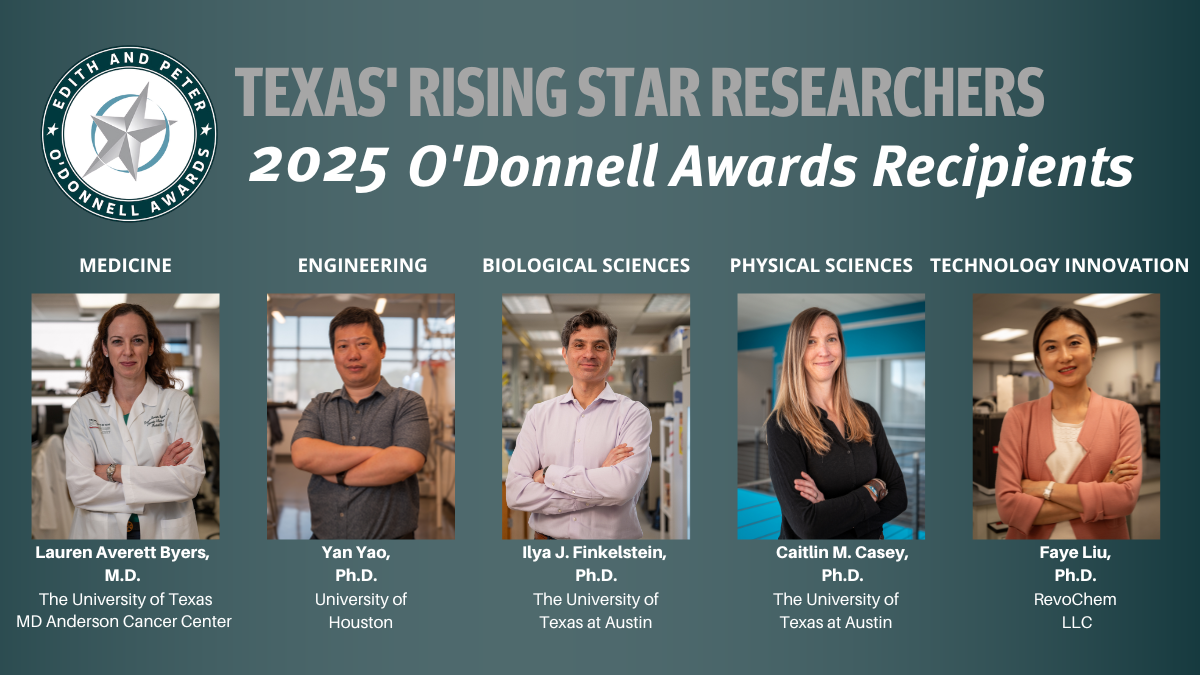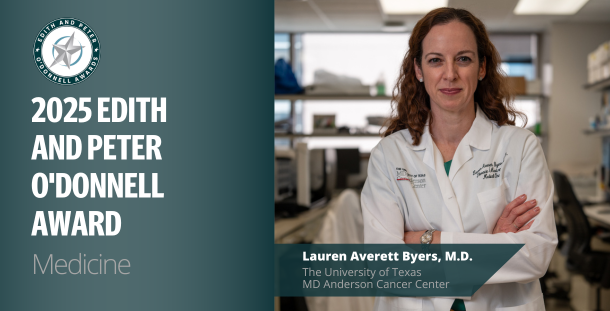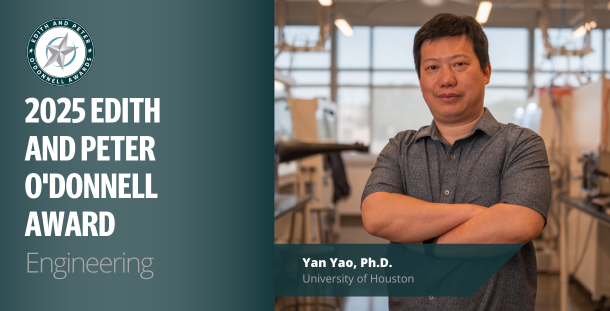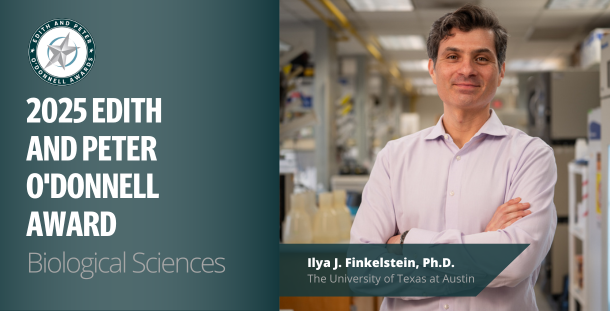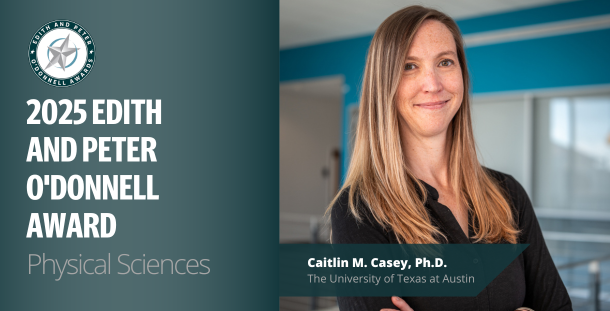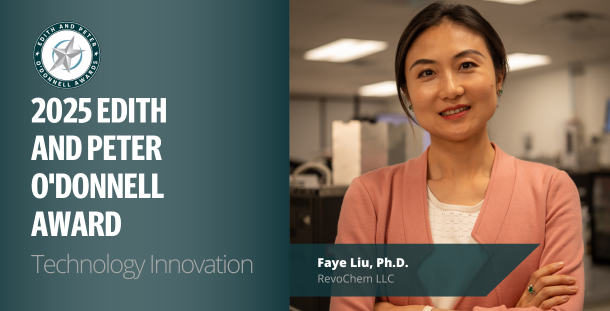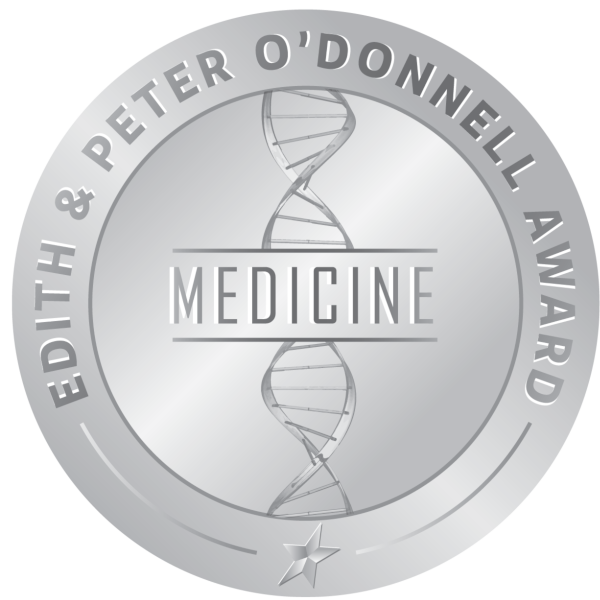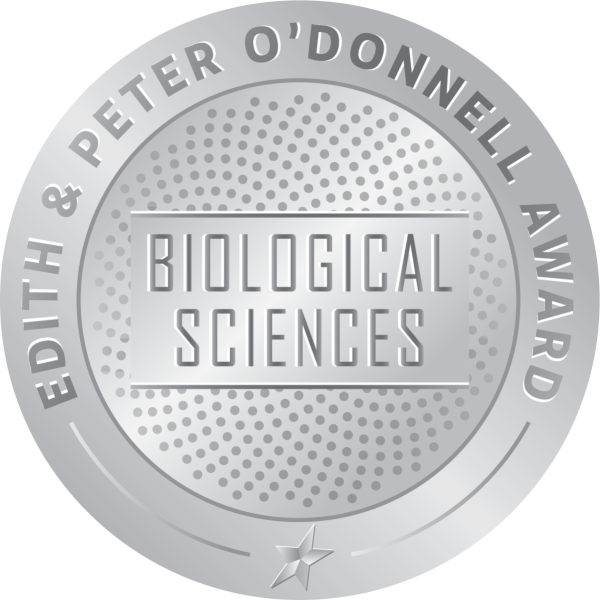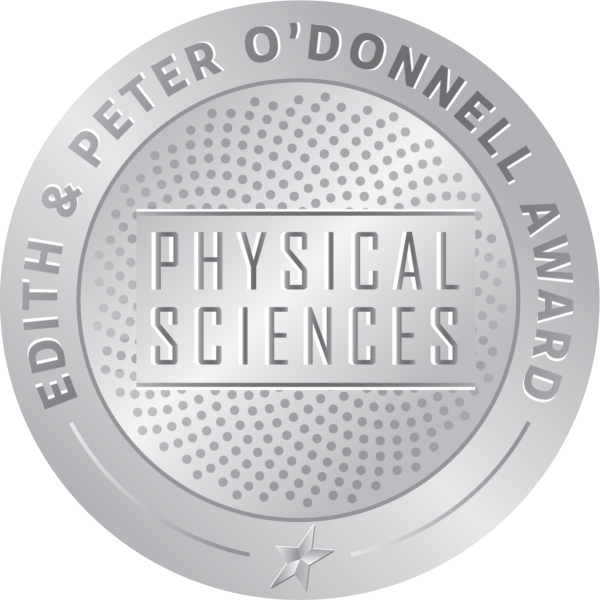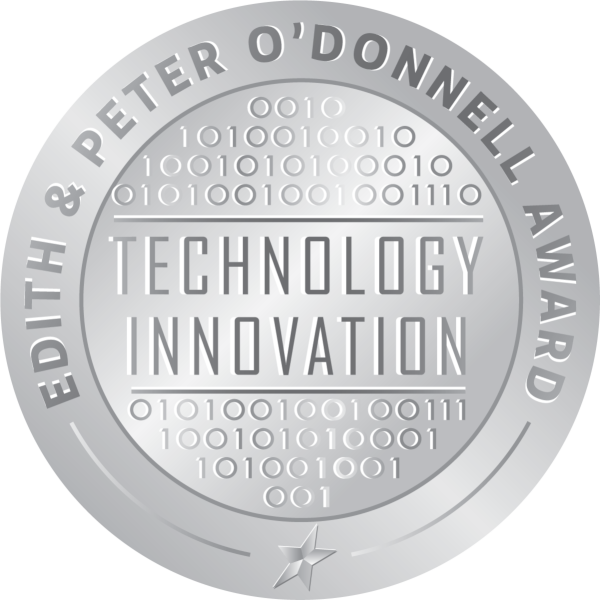TAMEST Edith and Peter O’Donnell Awards

The O’Donnell Awards acknowledge outstanding achievements by Texas-based researchers in five categories: medicine, engineering, biological sciences, physical sciences and technology innovation.
Each award includes a $25,000 honorarium and an invitation to present at TAMEST’s Annual Conference each year. Since 2006, 17 O’Donnell Awards recipients have been elected to one of the National Academies and six have been elected to multiple academies.
Nominations for the 2026 O’Donnell Awards closed on April 30, 2025. If you have any questions, please contact Stephanie Shaw at stephanie.shaw@austin.utexas.edu or (512) 471-3823.
Join Us for the 20th Anniversary O’Donnell Awards and Dinner
Save the date for the 20th Anniversary Edith and Peter O’Donnell Awards Ceremony and Dinner. The reception at the TAMEST 2026 Annual Conference: Pioneering Climate Innovations will mark 20 years since the awards were first given. We hope you can join us on Tuesday, February 3, 2026, to celebrate this special occasion at the Kimpton Santo Hotel in San Antonio, Texas. Registration for the conference will begin on September 10, 2025, and tickets to the anniversary reception and dinner are included.
2025 O’Donnell Awards Recipients
Identifying novel therapeutic strategies and making fundamental discoveries related to small cell lung cancer. Creating environmental and sustainable solutions for lithium-ion battery technology. Improving the safety and efficacy of gene editing and understanding the mechanisms of DNA repair to potentially cure diseases. Discovering the most distant and massive galaxies that have reshaped our understanding of early Universe star formation and supermassive black holes. Pioneering geochemical fingerprinting technology to optimize energy production processes.
These are the breakthroughs by Texas’ rising stars in research being honored with the 2025 Edith and Peter O’Donnell Awards by TAMEST.
Learn more >
Nomination Guidelines and Application
Nominations for the 2026 O’Donnell Awards closed on April 30, 2025.
Nomination Guides
For more detailed information on submitting a nomination, download the appropriate guide below:
Application
Nominations for the 2026 O’Donnell Awards closed on April 30, 2025.
General Guidelines
- The awards are open to all Texas-based applicants within 15 years of their first independent faculty appointment or 25 years from their first private sector or government position.
- Nominators may only designate one award category. The O’Donnell Awards Selection Committee reserves the right to move a nominee into a different category if they feel the nomination is more suitable for that category.
- All nominees will be automatically renominated for the following two years after the initial nomination (if the nominee meets all eligibility requirements). TAMEST staff will reach out to nominators regarding the status of their past nominee and provide the option to update or withdraw their nomination.
- Eligible nominators include TAMEST members, university presidents, chancellors, provosts, vice presidents for research, deans, department chairs, industry executives as well as former recipients of the award.
Selection Process
A committee of TAMEST members will evaluate nominations and select finalists in consultation with a panel of National Academies members from outside of Texas and a committee of Texas Nobel Laureates. TAMEST’s Board of Directors provides final approval of the award recipients.
Resources
- Frequently Asked Questions Guide >
- 2026 Edith and Peter O'Donnell Awards Information Session
For questions, contact Stephanie Shaw at stephanie.shaw@austin.utexas.edu or at (512) 471-3823.
Committee Members
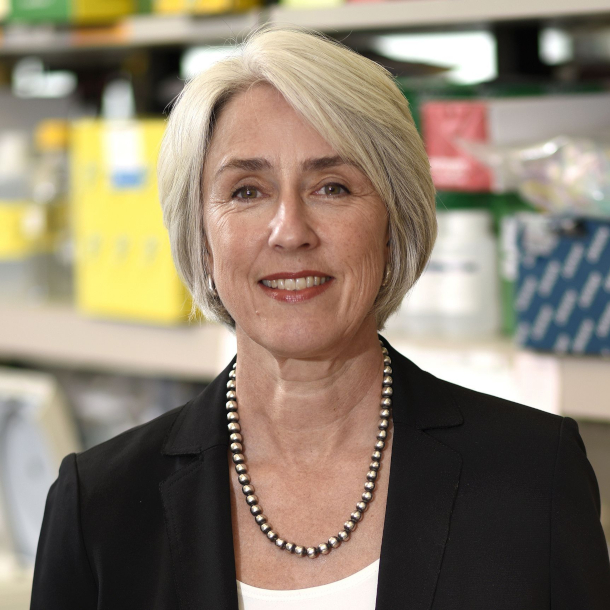
Margaret “Peggy” A. Goodell, Ph.D. (NAM, NAS)
Awards Committee Chair
Baylor College of Medicine
Medicine Subcommittee
- Maria Elena Bottazzi, Ph.D. (NAM), Baylor College of Medicine
- Kendall M. Campbell, M.D. (NAM), The University of Texas, Medical Branch at Galveston
- David R. Piwnica-Worms, M.D., Ph.D. (NAM), The University of Texas MD Anderson Cancer Center
Engineering Subcommittee
- Robert B. Gilbert, Ph.D. (NAE), The University of Texas at Austin
- Frances S. Ligler, D.Phil., D.Sc. (NAE), Texas A&M University
- Karen Lozano, Ph.D. (NAE), Rice University
Science Subcommittee – Biological
- Russell A. DeBose-Boyd, Ph.D. (NAS), UT Southwestern Medical Center
- Mark A. Kirkpatrick, Ph.D. (NAS), The University of Texas at Austin
- Richard D. Wood, Ph.D. (NAS, FRS), The University of Texas MD Anderson Cancer Center
Science Subcommittee – Physical
- Robert C. Kennicutt, Ph.D. (NAS, FRS), Texas A&M University
- Allan H. MacDonald, Ph.D. (NAS), The University of Texas at Austin
- Ramamoorthy Ramesh, Ph.D. (NAE, NAS, FRS), Rice University
Technology Innovation Subcommittee
- Leo H. Chiang, Ph.D. (NAE), Lubrizol
- Qinghuang Lin, Ph.D. (NAE), Canon Nanotechnologies, Inc.
- Jie Zhang, Ph.D. (NAE), GeoTomo
Nobel and Breakthrough Laureates Committee
James P. Allison, Ph.D. (NAM, NAS)
Chair, Department of Immunology and Executive Director, Immunotherapy Platform
Deputy Director, David H. Koch Center for Applied Research of Genitourinary Cancers
The University of Texas MD Anderson Cancer Center
Nobel Prize in Physiology or Medicine, 2018
Bruce A. Beutler, M.D. (NAM, NAS)
Regental Professor
Director of the Center for Genetics of Host Defense
UT Southwestern Medical Center
Nobel Prize in Physiology or Medicine, 2011
Michael S. Brown, M.D. (NAM, NAS)
Paul J. Thomas Professor of Molecular Genetics
Director of the Jonsson Center for Molecular Genetics
UT Southwestern Medical Center
Nobel Prize in Physiology or Medicine, 1985
Zhijian “James” Chen, Ph.D. (NAM, NAS, FRS)
Howard Hughes Medical Institute
George L. MacGregor Distinguished Chair in Biomedical Science
Professor, Department of Molecular Biology
UT Southwestern Medical Center
Breakthrough Prize in Life Sciences, 2019
Regental Professor Virginia and Edward Linthicum Distinguished Chair in Biomolecular Science
UT Southwestern Medical Center
Nobel Prize in Chemistry, 1988
Joseph L. Goldstein, M.D. (NAM, NAS)
Chairman of the Department of Molecular Genetics
UT Southwestern Medical Center
Nobel Prize in Physiology or Medicine, 1985
Helen H. Hobbs, M.D. (NAM, NAS)
Director, Eugene McDermott Center for Growth and Development; Professor of Internal Medicine and Molecular Genetics
Howard Hughes Investigator
UT Southwestern Medical Center
Breakthrough Prize in Life Sciences, 2015
Huda Y. Zoghbi, M.D. (NAM, NAS)
Distinguished Service Professor, Department of Molecular and Human Genetics
Director, Jan and Dan Duncan Neurological Research Institute
Investigator, Howard Hughes Medical Institute
Baylor College of Medicine
Breakthrough Prize in Life Sciences, 2017
Edith and Peter O’Donnell Awards 10th Anniversary
2016 marked the 10th anniversary of the O’Donnell Awards. Over $1 million has been awarded to dozens of recipients in the categories of medicine, engineering, science and technology innovation since the inception of the program. The awards are named in honor of Edith and Peter O’Donnell who are among Texas’ staunchest advocates for excellence in scientific advancement and STEM education.
O’Donnell Awards Supporters
The Edith and Peter O’Donnell Awards Endowment Fund was established in 2005 through the generous contributions of the following individuals and organizations:
- Dr. and Mrs. Kenneth Altshuler
- Anonymous (2)
- AT&T Foundation
- Austin Industries, Inc. and William T. Solomon, Former President, CEO and Chairman
- Julie and Louis A. Beecherl
- Melanie and Tim Byrne
- Mr. and Mrs. W. Plack Carr Jr.
- William P. and Rita Clements Jr.
- Collins Family Foundation
- Mr. and Mrs. Edward A. Copley
- The Cullen Foundation
- Cullen Trust for Health Care
- Cullen Trust for Higher Education
- Dell Inc.
- Hunt Consolidated, Inc.
- Kodosky Foundation
- The Eugene McDermott Foundation
- The Robert and Janice McNair Foundation
- The Rodger Meier Family
- Joyce and Harvey Mitchell
- National Instruments
- Edith and Peter O’Donnell
- Margot and Ross Perot
- Caren H. Prothro & The Vin and Caren Prothro Foundation
- Rowling Foundation
- Southwestern Medical Foundation
- Ron and Phyllis Steinhart
- Susser Family Foundation in Honor of Mr. and Mrs. Ron Steinhart
- Temple-Inland
- Texas Instruments Foundation
- TXU Energy
- Valero Energy Foundation
- Dr. and Mrs. Kern Wildenthal
- Cheryl and Sam Wyly
- Dee and Charles Wyly
- Zachry Foundation
2024 O’Donnell Endowment Gifts
(Updated December 20, 2024)
Rebecca Nelson Davis (In Memory of Peter and Edith O’Donnell)
Stephen A. Fuselier, Ph.D.
David R. Piwnica-Worms, M.D., Ph.D., and Helen Piwnica-Worms, Ph.D.
Past O’Donnell Awards Recipients
Learn about our past recipients by clicking on a category below.


